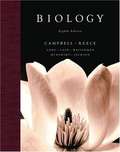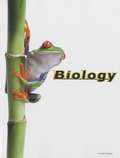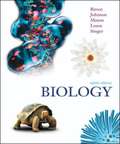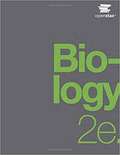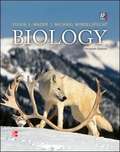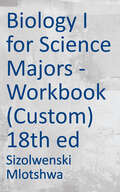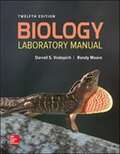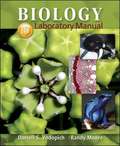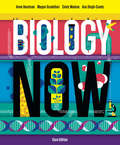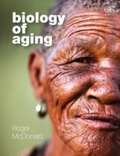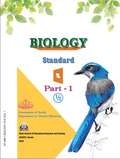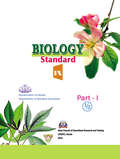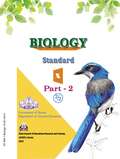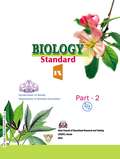- Table View
- List View
Biology (California)
by Stephen Nowicki"The 21st century will be the century of biological science, just as the 20th century was the century of physical science," predicts Professor Stephen Nowicki, an award-winning teacher at Duke University. Dr. Nowicki has adapted his acclaimed introductory biology course for The Teaching Company to bring you up to date on one of the most important fields of knowledge of our time and help you appreciate the marvelous diversity and complexity of life. You will obtain the background and guidance to explore in depth the fundamental principles of how living things work-principles such as evolution by natural selection, the cellular structure of organisms, the DNA theory of inheritance, and much more. This challenging course is organized around three major themes: "Information and Evolution," "Development and Homeostasis," and "Energy and Resources." You will explore living systems at all levels, from biological molecules to global ecosystems. You will gain insight into pressing issues facing society, including genetic modification and cloning, stem-cell research, AIDS, the depletion of the rainforests, and global warming. You will discover mechanisms behind such intriguing phenomena as why children resemble their parents, why plants bend toward light, how memories are stored, why some birds have very long tails, and how life itself began on Earth. Above all, you will learn how to think about biology, so that in your day-to-day life you will understand the significance and complexities of news stories, medical issues, and public debates, not to mention what is going on in your own garden and in nature all around you.
Biology (Eighth Edition)
by Jane B. Reece Neil A. Campbell Robert B. Jackson Michael L. Cain Peter V. Minorsky Lisa A. Urry Steven A. WassermanBiology, Eighth Edition, serves students as a textbook in their general biology course and also later as a useful tool for review and reference. It encourages students to practice thinking as scientists by tackling the "What if?" questions in the Concept Checks and Inquiry Figures (and occasional figure legends), as well as the "Scientific Inquiry" questions in the Chapter Review.
Biology (Fourth Edition)
by Brad R. Batdorf Elizabeth A. LacyIn this text students will see God's power and glory in creation as they learn about cellular biology, genetics, taxonomy, microbiology, botany, zoology, and human anatomy. When studying topics such as Creation and evolution, human cloning, abortion, and stem cell research, students are pointed to Scripture as the ultimate authority and are encouraged to develop a biblical perspective about these topics" --
Biology (Georgia)
by Stephen Nowicki"The 21st century will be the century of biological science, just as the 20th century was the century of physical science," predicts Professor Stephen Nowicki, an award-winning teacher at Duke University. Dr. Nowicki has adapted his acclaimed introductory biology course for The Teaching Company to bring you up to date on one of the most important fields of knowledge of our time and help you appreciate the marvelous diversity and complexity of life. You will obtain the background and guidance to explore in depth the fundamental principles of how living things work-principles such as evolution by natural selection, the cellular structure of organisms, the DNA theory of inheritance, and much more. This challenging course is organized around three major themes: "Information and Evolution," "Development and Homeostasis," and "Energy and Resources." You will explore living systems at all levels, from biological molecules to global ecosystems. You will gain insight into pressing issues facing society, including genetic modification and cloning, stem-cell research, AIDS, the depletion of the rainforests, and global warming. You will discover mechanisms behind such intriguing phenomena as why children resemble their parents, why plants bend toward light, how memories are stored, why some birds have very long tails, and how life itself began on Earth. Above all, you will learn how to think about biology, so that in your day-to-day life you will understand the significance and complexities of news stories, medical issues, and public debates, not to mention what is going on in your own garden and in nature all around you.
Biology (Kentucky)
by Stephen Nowicki"The 21st century will be the century of biological science, just as the 20th century was the century of physical science," predicts Professor Stephen Nowicki, an award-winning teacher at Duke University. Dr. Nowicki has adapted his acclaimed introductory biology course for The Teaching Company to bring you up to date on one of the most important fields of knowledge of our time and help you appreciate the marvelous diversity and complexity of life. You will obtain the background and guidance to explore in depth the fundamental principles of how living things work-principles such as evolution by natural selection, the cellular structure of organisms, the DNA theory of inheritance, and much more. This challenging course is organized around three major themes: "Information and Evolution," "Development and Homeostasis," and "Energy and Resources." You will explore living systems at all levels, from biological molecules to global ecosystems. You will gain insight into pressing issues facing society, including genetic modification and cloning, stem-cell research, AIDS, the depletion of the rainforests, and global warming. You will discover mechanisms behind such intriguing phenomena as why children resemble their parents, why plants bend toward light, how memories are stored, why some birds have very long tails, and how life itself began on Earth. Above all, you will learn how to think about biology, so that in your day-to-day life you will understand the significance and complexities of news stories, medical issues, and public debates, not to mention what is going on in your own garden and in nature all around you.
Biology (Ninth Edition)
by Peter H. RavenThe ninth edition of this text provides a clear and accessible overview of the key topics in biology, placing the emphasis on evolution and scientific inquiry.
Biology (Ohio edition)
by Stephen NowickiThe book gives you a general understanding of what modern biology is all about. You will explore scientific thinking, methods, equipment, and experimentation. It introduces the information in the characteristics and structures of life science indicators, scientific inquiry, and science and technology indicators.
Biology (South Carolina Edition)
by Kenneth R. Miller Joseph S. LevineThe goal of the Science Academic Standards is for all students to gain scientific literacy. Literacy means an understanding of what is important in an area of knowledge. To become literate in science, you need to develop a way of thinking and learn a body of knowledge about the natural world.
Biology (Texas)
by Alton Biggs Whitney Crispen Hagins William G. HollidayGlencoe Biology helps all students succeed with its organization around major Themes, Big Ideas, and Main Ideas of biology and its strong support for reading comprehension. This program's comprehensive content is made relevant to students through engaging real-world contexts. A wide variety of lab experiences builds strong inquiry skills. The abundance of differentiated instructional strategies helps teachers reach all learners. Seamlessly integrated technology allows teachers to save time and increase productivity.
Biology 10th Class Telugu Medium -Telangana Board
by Telangana ScertThis is the prescribed text book for the subject of Biology in Telugu Medium for the students of 10th class in Telangana State board
Biology 11th Edition
by Sylvia S. Mader Michael WindelspechtSylvia Mader represents one of the icons of science education. Her dedication to her students, coupled with her clear, concise writing style has benefited the education of thousands of students over the past three decades. Dr. Michael's Windelspecht: The integration of text and the digital world are now complete with the addition of Michael's Windelspecht's expertise in the development of digital learning assets.
Biology 2e
by OpenStaxBOOK SUMMARY: Biology 2e is designed to cover the scope and sequence requirements of a typical two-semester biology course for science majors. The text provides comprehensive coverage of foundational research and core biology concepts through an evolutionary lens. Biology includes rich features that engage students in scientific inquiry, highlight careers in the biological sciences, and offer everyday applications. The book also includes various types of practice and homework questions that help students understand and apply key concepts. <P><P> The 2nd edition has been revised to incorporate clearer, more current, and more dynamic explanations, while maintaining the same organization as the first edition. Art and illustrations have been substantially improved, and the textbook features additional assessments and related resources.
Biology AP Edition
by Sylvia S. Mader Michael WindelspechtThis comprehensive introductory textbook covers biology traditionally - from the structure and function of the cell to the organization of the biosphere. The new 11th AP Edition ofBiologyfeatures integrated coverage of the newAP Biology Curriculum Frameworkwith Part Openers that provide an overview of the Big Idea as it relates to the chapters within the Part. In addition, each chapter begins with a guide to Following the Big Ideas and concludes with a Connecting the Concepts with the Big Ideas section. The preface includes information on the AP Biology course, the AP Exam, and an AP Correlation, while a complete AP Practice Exam can be found in the back of the book. An icon of science education, Sylvia Mader's dedication to her students, coupled with a concise writing style, has benefitted the education of thousands of students. The integration of this classic text and the digital world is now completed with the addition of Dr. Michael Windelspecht's expertise in the development of digital learning assets. He has acted as the leading architect in the design of the accompanying media content forMcGraw-Hill'sConnect PlusandLearnSmart. These assets allow teachers to easily design interactive tutorial materials, enhance online and traditional presentations, and assess the learning objectives and outcomes of the course. New pedagogical tools: Before You Begin: Students assess their mastery of prerequisite key concepts before proceeding further into the chapters Media Integration Hallmark Mader Art Program: The highly acclaimed artwork inBiologyhas become the hallmark of this flagship text Connect Plus: This web-based assignment and assessment platform includes an integrated eBook, dynamic links between the problems or questions assigned and the location in the eBook where they are covered, fully integrated self-study questions you can assign, pagination that matches the print text, embedded media, and text you can customise for students with notes and highlights.
Biology Exploring Life
by Neil A. Campbell Brad Williamson Robin J. HeydenOnly Biology: Exploring Life integrates textbook, Web, and labs into a dynamic and balanced program that brings concepts to life. This update includes new Web resources and greater coverage for 21st century skills.
Biology I for Science Majors: Workbook (Custom)
by Sizolwenski MlotshwaBiology I for Science Majors - Workbook (Custom) 18th ed
Biology Laboratory Manual
by Randy Moore Darrell VodopichThe Biology Laboratory Manual by Vodopich and Moore was designed for an introductory biology course with a broad survey of basic laboratory techniques. The experiments and procedures are simple, safe, easy to perform, and especially appropriate for large classes. Few experiments require more than one class meeting to complete the procedure. <p><p>Each exercise includes many photographs, traditional topics, and experiments that help students learn about life. Procedures within each exercise are numerous and discrete so that an exercise can be tailored to the needs of the students, the style of the instructor, and the facilities available.
Biology Laboratory Manual (Tenth Edition)
by Randy Moore Darrell VodopichThe Biology Laboratory Manual by Vodopich and Moore was designed for an introductory biology course with a broad survey of basic laboratory techniques. The experiments and procedures are simple, safe, easy to perform, and especially appropriate for large classes. Few experiments require more than one class meeting to complete the procedure. Each exercise includes many photographs, traditional topics, and experiments that help students learn about life. Procedures within each exercise are numerous and discrete so that an exercise can be tailored to the needs of the students, the style of the instructor, and the facilities available.
Biology Now
by Anu Singh-Cundy Anne Houtman Megan Scudellari Cindy MaloneA balance of science and story, with a focus on the people doing biology now.Written by a science journalist and teachers with over thirty years experience in the classroom, Biology Now skillfully blends core biology concepts with popular science stories of real people doing science today. These stories capture the human face of biology, highlighting the work of researchers and medical professionals who are making new discoveries every day. The text is accompanied by a wealth of carefully crafted pedagogy that teaches students how to analyze science in the news, interpret data, ask questions, and distinguish between science and pseudoscience.
Biology Of Aging
by Roger B. McDonaldBiology of Aging presents the biological principles that have led to a new understanding of the causes of aging and describes how these basic principles help one to understand the human experience of biological aging, longevity, and age-related disease. Intended for undergraduate biology students, it describes how the rate of biological aging is measured; explores the mechanisms underlying cellular aging; discusses the genetic pathways that affect longevity in various organisms; outlines the normal age-related changes and the functional decline that occurs in physiological systems over the lifespan; and considers the implications of modulating the rate of aging and longevity. The book also includes end-of-chapter discussion questions to help students assess their knowledge of the material.
Biology Part 1 class 10 - S.C.E.R.T. - Kerala Board
by State Council of Educational Research TrainingBiology Part 1 textbook for 10th standard from State Council of Educational Research and Training (S.C.E.R.T.) Kerala in English.
Biology Part 1 class 9 - S.C.E.R.T. - Kerala Board
by State Council of Educational Research TrainingBiology Part 1 text book for 9th standard from State Council of Educational Research and Training (S.C.E.R.T.) Kerala in English.
Biology Part 2 class 10 - S.C.E.R.T. - Kerala Board
by State Council of Educational Research TrainingBiology Part 2 textbook for 10th standard from State Council of Educational Research and Training (S.C.E.R.T.) Kerala in English.
Biology Part 2 class 9 - S.C.E.R.T. - Kerala Board
by State Council of Educational Research TrainingBiology Part 2 text book for 9th standard from State Council of Educational Research and Training (S.C.E.R.T.) Kerala in English.

